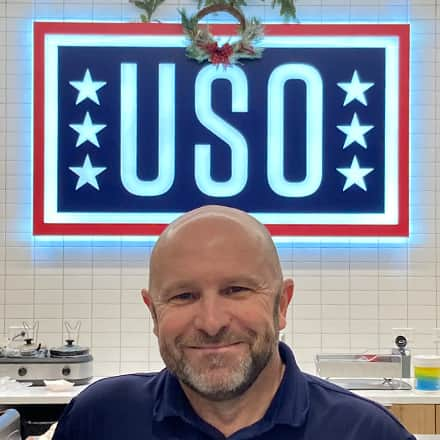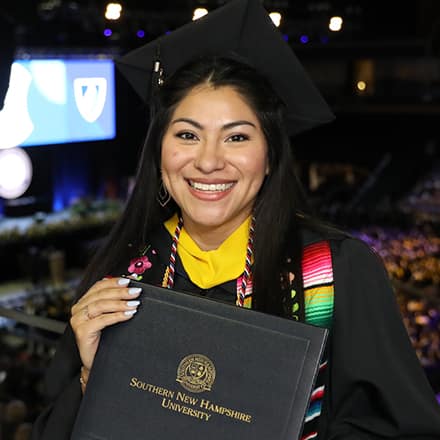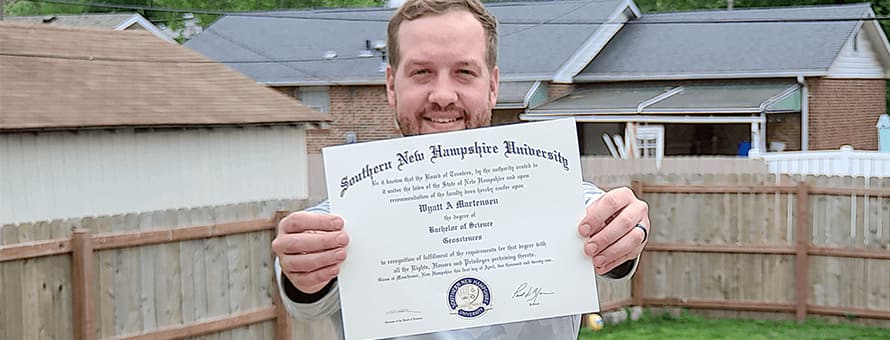Wyatt Martensen: Balancing School, Deployment and Family
When your chief warrant officer asks you to do something with him, you're most likely going to do it. That's how Wyatt Martensen '21 tells the story of how he ended up returning to school to earn his bachelor's degree online.
"I started this journey at Southern New Hampshire University (SNHU) when I was deployed in Afghanistan in 2017 to 2018," he said. "I was sitting there in my office, and my chief warrant officer came up to me and said, 'You know, I think it would be a good idea for you to start classes at Southern New Hampshire (University) with me.'"
Martensen pauses to chuckle.
"I said, 'Do you really think this is the right time for it?' and he looked at me, and he said, 'There's no better time to start than right now.'"
Before the Bachelor's Degree

"What held me back from going back to school was life in general," Martensen said. It's a reason given by so many adults who return to school later in life – including those at SNHU.
After high school, he earned an associate degree in electronic media production at a nearby technical community college.
"Being on campus was challenging at times because you had to commute there," said the St. Louis resident. "You had to find parking, and you had to go to certain classrooms, which was fine, but even in a classroom setting – the professors they help you, but I feel like sometimes that getting ahold of them there, they have a lot of students."
After finishing up that degree, he didn't have much of a plan to continue his education. In fact, he joined the Army. It was during his military service that he began doing geospatial work. And it was there that he realized he might actually enjoy doing it as a civilian profession.
Enter his chief warrant officer – and the opportunity to continue this career path beyond the military.
Balancing it All
That officer helped him enroll in classes. "Southern New Hampshire University had the exact degree for what I was looking for," he said about the bachelor's in geosciences.

"But the way that the classes are structured and the way that the assignments are turned in, it gives you the flexibility to work on it early in the week and be able to turn it in later that week, or even on a weekend," he said.
Martensen appreciated the 8-week-long terms. "It wasn't anything unachievable," he said. "There was no point in time where I felt extremely stressed out about taking the classes – even when I was deployed."
Another factor that made his bachelor's program doable was the credits he was able to transfer. SNHU accepts up to 90 credits in the form of college, military or work experience.
"I was able to get done faster than I thought," he said. "In fact, I graduated six months earlier than I thought I was going to graduate, so having the college courses transfer over from my previous school definitely helped and definitely gave me a head-start on starting college again."
Built-In Support System
Martensen came to appreciate the support SNHU provided him.
"I thought that was awesome the first time that I got a call from an academic advisor," he said. "I looked at the phone, and I was like, 'I don't recognize this number.' ... It was an academic advisor just checking in on me."
He was pretty surprised. "At that point, I was like, 'Wow, I've never had anybody from a school call me just to see how I'm doing'," he said.
And as an active-duty service member, he was afraid he might have to go through a few additional hoops to get started. But that wasn't the case.
"As soon as I told my academic advisor that I was military and I was using a GI Bill®, they took care of everything," Martensen said. "I didn't have to do any major paperwork. I had to answer a few questions – and they literally took it from there."
Prior to SNHU, he had worried that his military status might create a few barriers for him as he began the process to earn his bachelor's.
"One of the major reasons why I hesitated for so long to going back to college was I didn't want to have to deal with, you know, making sure the funds were taken care of correctly," he said. "I didn't know how stressful it would be with getting everything aligned to make sure that my classes were all set."
What he didn't know at the time was that SNHU has had a reputation for helping service members wherever they are, dating to its beginnings in the '30s and '40s. It's regularly named a Military Friendly® School, offers a significant tuition discount to active-duty service members and their spouses, and serves an almost 1 in 5 military or military-affiliated student population.
And that's not to mention the instructors who worked around his military schedule if he was in a remote location and had no computer or internet access.
"I believe that the entire staff and faculty at Southern New Hampshire University understands the military side of schooling better than most," he said.
For His Family – and for Himself
The community at SNHU wasn't his only support system.
"Other people that really helped me get through my academic achievements were my wife and my son," he said. "I knew that I wasn't only doing this for myself, I was also doing it for my family."
His wife and his son cheered him on along the way.
Martensen said that she'd tell him: "You know you can do this, you can. ... All you have to do is keep doing what you're doing, studying what you're studying, and you're going to make it."
As for his young son, Martensen wants to make him proud – and also inspire him.
"I hope someday that my son will look at the degree that I have and look at the time that I spent – even with my busy schedule – I hope that he will see that as, 'Hey, my dad can do it. I can do it as well. ... I can do it online, and I don't even have to do it when I'm younger'," he said.
Finishing his final project, opening the envelope with his degree, realizing how hard it would have been to get the position he's in without that piece of paper – they're all moments that Martensen feels pride for.
"It was worth being able to have the opportunity to be part of something bigger for myself and for my family and my career path," he said. "It was worth everything I put into it."
Consider how a bachelor's degree can change your life.
Deidre Ashe was 9 years old when she launched her professional writing career. While spending a day at work with her dad, she penned her first book, illustrated it and sent it off to a publishing company — after finding the address on the copyright page of one of her paperbacks. While the story never made it to the shelves of libraries, the editors wrote back, encouraging her to continue pursuing her writing passion. (Yes, she still has that letter.)
After earning a bachelor’s in journalism, Ashe spent a decade working in the media industry. She then transitioned into marketing, later getting her MA in Communication from Southern New Hampshire University in 2018. Connect with her on LinkedIn.
GI Bill® is a registered trademark of the U.S. Department of Veterans Affairs (VA). More information about education benefits offered by the VA is available at the official U.S. government website.
Explore more content like this article

5 Military Spouses Awarded Full-Tuition Scholarships to SNHU

Air Force Veteran Turns SNHU Degree Into an Opportunity to Still Serve

From Sacrifices to Success: Hard Work Pays Off for Military Spouse
About Southern New Hampshire University

SNHU is a nonprofit, accredited university with a mission to make high-quality education more accessible and affordable for everyone.
Founded in 1932, and online since 1995, we’ve helped countless students reach their goals with flexible, career-focused programs. Our 300-acre campus in Manchester, NH is home to over 3,000 students, and we serve over 135,000 students online. Visit our about SNHU page to learn more about our mission, accreditations, leadership team, national recognitions and awards.



